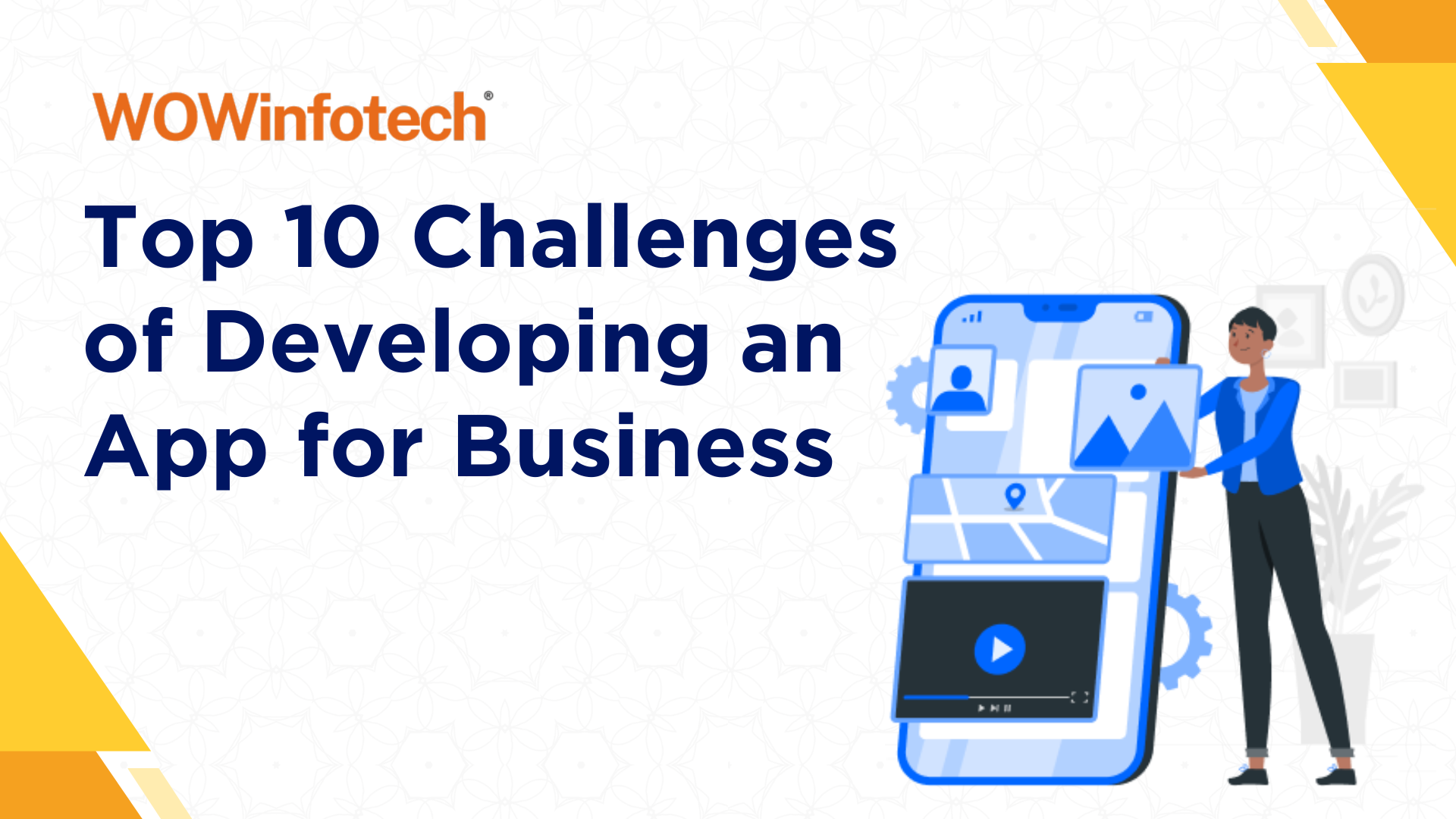Developing a successful business app can be daunting, with many challenges that must be navigated. From identifying the right target audience to maintaining and updating the app, each stage of the development process presents its own unique set of obstacles. In this blog post, we will explore the top 10 challenges that businesses often face when creating an app, providing valuable insights and practical solutions to help you overcome these hurdles.
Whether you're an entrepreneur or a newcomer to the world of mobile app development, this comprehensive guide will equip you with the knowledge and strategies needed to turn app idea into a thriving reality.
By addressing key considerations such as defining the app's purpose, designing a user-friendly interface, and managing development costs, we aim to empower you to make informed decisions and create an app that truly resonates with target market. Join us as we delve into the intricacies of app development and uncover the secrets to building a successful business app.
Identifying the Right Target Audience
Identifying the right target audience is a crucial first step in developing a successful business app. This step lays the foundation for all subsequent decisions, ensuring that app resonates with the individuals who are most likely to engage with and benefit from its features. To effectively identify target audience, consider the following key factors:
Demographic Analysis
Gather data on the age, gender, location, and other relevant demographics of potential users. This information will help you tailor app's content, design, and functionality to meet their specific needs and preferences.
Behavioral Insights
Understand the pain points, interests, and behaviors of target audience. This will enable you to create an app that provides genuine value and addresses their unique challenges.
Market Research
Conduct thorough market research to understand the competitive landscape and identify any gaps or unmet needs that app can fill. This will help you differentiate offering and appeal to target audience.
Defining the App's Purpose and Features
Clearly defining the purpose and features of business app is a crucial first step in the development process. This step lays the foundation for all subsequent decisions and ensures that app aligns with business objectives.
Identify app's Core Functionality
Determine the primary purpose of app and the core features that will fulfill this purpose. This could involve streamlining workflows, enhancing customer engagement, or providing valuable information to target audience.
Prioritize Features Based on User Needs
Conduct market research to understand the pain points and needs of target users. Prioritize the features that will address these needs and provide the most value to customers, ensuring a seamless and engaging user experience.
Designing a User-Friendly Interface
Create a Visually Appealing Design
Crafting a visually appealing design is crucial for capturing and retaining user attention. Incorporate a clean, modern aesthetic that aligns with brand identity. Utilize intuitive icons, clear typography, and strategic use of color to guide users through the app seamlessly.
Prioritize Simplicity and Ease of Use
Ensure app's interface is simple and easy to navigate. Minimize clutter, streamline user flows, and make key features readily accessible. Conduct user testing to identify and address any pain points or areas of confusion, creating an intuitive experience that delights audience.
Developing a Secure App
Ensuring the security of business app is paramount, as it not only protects customers' sensitive information but also safeguards the integrity of brand. Two key considerations when developing a secure app include:
Implementing Robust Encryption Protocols
Utilize industry-standard encryption algorithms and protocols, such as SSL/TLS, to secure data transmission and storage. This helps prevent unauthorized access and ensures the confidentiality of user information.
Incorporating Secure Authentication Measures
Implement secure authentication methods, such as multi-factor authentication or biometric identification, to verify user identities and prevent unauthorized access to the app. This enhances the overall security of application.
Testing and Quality Assurance
Ensuring the quality and reliability of business app is crucial for its success. Thorough testing and quality assurance measures should be implemented throughout the development process to identify and address any issues or bugs. This includes:
Comprehensive Testing Strategies
Implement a comprehensive testing plan that covers unit testing, integration testing, and end-to-end testing to ensure the app's functionality, performance, and security.
User Acceptance Testing
Involve target users in the testing process to gather feedback and validate the app's usability, user experience, and alignment with their needs.
Continuous Quality Monitoring
Establish a system for ongoing monitoring and testing to quickly identify and resolve any issues that may arise after the app's launch.
Compliance and Regulatory Checks
Ensure app meets all relevant industry standards, regulations, and guidelines to avoid legal or compliance-related challenges.
Choosing the Right Development Platform
Selecting the appropriate development platform is a critical decision that can significantly impact the success of business app. This choice involves carefully weighing the pros and cons of various options, such as native platforms (iOS, Android), cross-platform frameworks (React Native, Flutter), and web-based solutions (Progressive Web Apps).
Target Audience: Understand the device preferences and operating systems of target users to ensure app is accessible and compatible.
Development Costs: Evaluate the resources and expertise required for each platform, as this can greatly influence overall development budget.
Scalability and Maintenance: Choose a platform that offers long-term sustainability, seamless updates, and the ability to scale app as business grows.
Managing Development Costs
Developing a business app can be a significant financial investment, and managing the associated costs is crucial for the project's success. Here are three key considerations to help you navigate the challenge of managing development costs:
Prioritize Features
Carefully evaluate the app's core functionalities and prioritize the most essential features. This will help you focus resources on the most valuable aspects of the app, reducing unnecessary spending on non-essential elements.
Explore Cost-Effective Solutions
Investigate cost-effective development platforms, tools, and resources that can help you achieve goals without breaking the bank. This may include leveraging open-source technologies, outsourcing specific tasks, or exploring alternative development approaches.
Establish a Realistic Budget
Create a detailed budget that accounts for all aspects of the development process, including design, programming, testing, and ongoing maintenance. This will help you anticipate and plan for potential expenses, ensuring that project stays on track and within financial constraints.
Integrating with Existing Systems
Integrating business app with existing systems can be a complex and challenging task, but it is crucial for ensuring seamless data flow and efficient operations. Two key considerations when integrating app with existing systems include:
Compatibility and Data Synchronization
Ensuring app is compatible with the various software and platforms used by business is essential. This includes seamless data synchronization, allowing information to flow effortlessly between app and existing systems, such as customer relationship management (CRM) tools, accounting software, or inventory management systems.
API Integration
Using application programming interfaces (APIs) can greatly simplify the integration process. By connecting app to the APIs of existing systems, you can streamline data exchange and automate various business processes, ultimately enhancing efficiency and productivity.
Marketing and Promotion
Effective marketing and promotion are crucial for the success of business app. However, this can be a significant challenge, as the app market is highly competitive, and standing out from the crowd can be difficult. To overcome this challenge, consider the following strategies:
Social Media Platforms
Utilize popular social media platforms like Facebook, Twitter, and Instagram to create engaging content and reach target audience. Share updates, behind-the-scenes glimpses, and user-generated content to build a strong brand presence and foster a loyal following.
Implement a Comprehensive Content Strategy
Develop a comprehensive content strategy that includes blog posts, videos, and other informative resources. This will not only help you educate audience about app's features and benefits but also position brand as an industry thought leader.
Maintaining and Updating the App
Maintaining and updating business app is a crucial, yet often overlooked, aspect of the development process. Ensuring the long-term success of app requires a proactive approach to addressing user feedback, fixing bugs, and implementing new features.
Staying Responsive to User Needs
Regularly gathering user feedback and addressing their pain points is essential for maintaining a relevant and engaging app. By actively listening to users and implementing their suggestions, you can ensure app continues to meet their evolving needs.
Adapting to Technological Advancements
The mobile app landscape is constantly evolving, with new technologies and platform updates being released regularly. Keeping app up-to-date with the latest features and security protocols is crucial for maintaining its competitiveness and ensuring a seamless user experience.
Developing a successful business app involves navigating various challenges. Firstly, understanding the target audience through demographic analysis, behavioral insights, and market research is crucial. Clearly defining the app's purpose and features ensures alignment with business objectives. Designing a user-friendly interface with simplicity and visual appeal enhances engagement. Security measures, including encryption and authentication, safeguard user data. Thorough testing and quality assurance maintain app reliability. Choosing the right development platform considers audience preferences, costs, and scalability. Managing development costs involves prioritizing features, exploring cost-effective solutions, and establishing a realistic budget. Integrating with existing systems requires compatibility and API integration. Effective marketing through social media and content strategies promotes app visibility. Lastly, maintaining and updating the app involves staying responsive to user feedback and adapting to technological advancements for long-term success.
If you're looking mobile app development services for business, WOWinfotech is go-to solution. Whether you need a brand-new app or looking to enhance your existing one, we've got you covered. With our expertise and dedication, we craft custom solutions tailored to specific needs, ensuring a worthy result every time. Contact us at +91 9370104077 or info@wowinfotech.com to discuss the project in detail and discover how we can turn app ideas into reality. Let WOWinfotech be a partner in success!
-

Krishna Handge
WOWinfotech
Apr 25,2024
